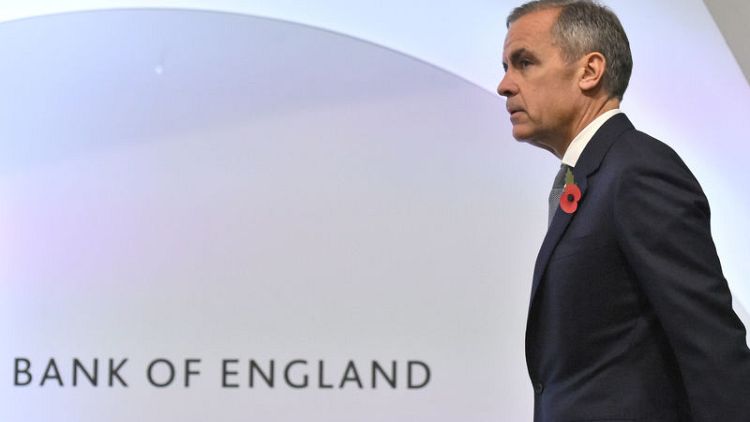By David Milliken and Andy Bruce
LONDON (Reuters) - Two Bank of England officials unexpectedly voted to lower interest rates to ward off an economic slowdown, and others said on Thursday they would consider a cut if global and Brexit headwinds do not lift.
The BoE said its nine rate-setters voted 7-2 at their November meeting to keep Bank Rate at 0.75%, in contrast to forecasts in a Reuters poll for a unanimous decision.
Sterling hit a two-week low against the U.S. dollar and a measure of interest rate futures <BOEWATCH> priced in an 80% chance of a rate cut next year, up from about 55% previously.
BoE Governor Mark Carney said there were greater risks from the slowing global economy but there was also some room to hope that Britain's protracted Brexit uncertainty might end soon.
"Now it's become possible that the picture in the UK could change, with the recent UK-EU withdrawal agreement creating the prospects for a pick-up in UK growth," Carney said.
"The pace of that recovery will depend critically on the extent to which uncertainty over the future UK-EU trading relationship actually dissipates, and, to a much lesser degree, by how much the global economy actually picks up."
The BoE has resisted following the U.S. Federal Reserve and the European Central Bank in cutting its main interest rate.
But two external Monetary Policy Committee members, Michael Saunders and Jonathan Haskel, cast the first votes for lower rates since the BoE last cut them in August 2016 following Britain's referendum decision to leave the European Union.
Peter Dixon, an economist at Commerzbank, said he did not expect the majority of the MPC to back a rate cut soon.
"I think it makes sense to keep their power dry until we see where we are, if and when Brexit decision actually takes place, because if it goes wrong, the Bank is going to need all the ammunition it can get," he said.
Prime Minister Boris Johnson has called an early election for Dec. 12 in a bid to get a parliamentary majority to pass his Brexit deal before a new deadline of Jan. 31.
Both parties are promising to end years of austerity if they win and spend billions investing in infrastructure -- funded by borrowing at record-low interest rates -- to try to fuel growth.
JOB MARKET WORRIES
Saunders and Haskel said their change in stance was driven by reduced job vacancies that suggested the labour market was turning, and downside risks from the world economy and Brexit.
For the others, Britain's economy had not performed much differently than they had expected three months ago but they showed a new openness to cutting rates if things soured.
"If global growth failed to stabilise or if Brexit uncertainties remained entrenched, monetary policy might need to reinforce the expected recovery in UK GDP growth and inflation," they said in a summary of their policy discussion.
They also softened long-standing language on the medium-term need for limited and gradual rate hikes, saying they "might" rather than "would" be necessary.
The BoE as a whole painted a darker picture for Britain's economy over the next three years, predicting it will grow 1% less over the period than it had forecast in August.
About three quarters of this was due to a weaker global economy and strengthening in sterling since the risk of a no-deal Brexit had diminished, but part of it reflected Johnson's Brexit plans.
The BoE now assumes Britain will strike a trade deal that leads to new customs checks and puts up barriers to exports of financial and legal services.
Growth would have been forecast to be weaker still, if the government had not announced major fiscal stimulus in September.
Inflation, currently 1.7%, is forecast to drop to 1.2% in the middle of next year due to lower oil prices and regulatory caps on electricity and water bills.
But over the next couple of years, the BoE still sees growth picking up from 1.4% this year to 2.0% in 2022. The 2022 growth rate is above Britain's long-term trend and would push inflation back above the BoE's 2% goal, the central bank said.
(Additional reporting by Rahul Karunakar; Editing by William Schomberg and Catherine Evans)



